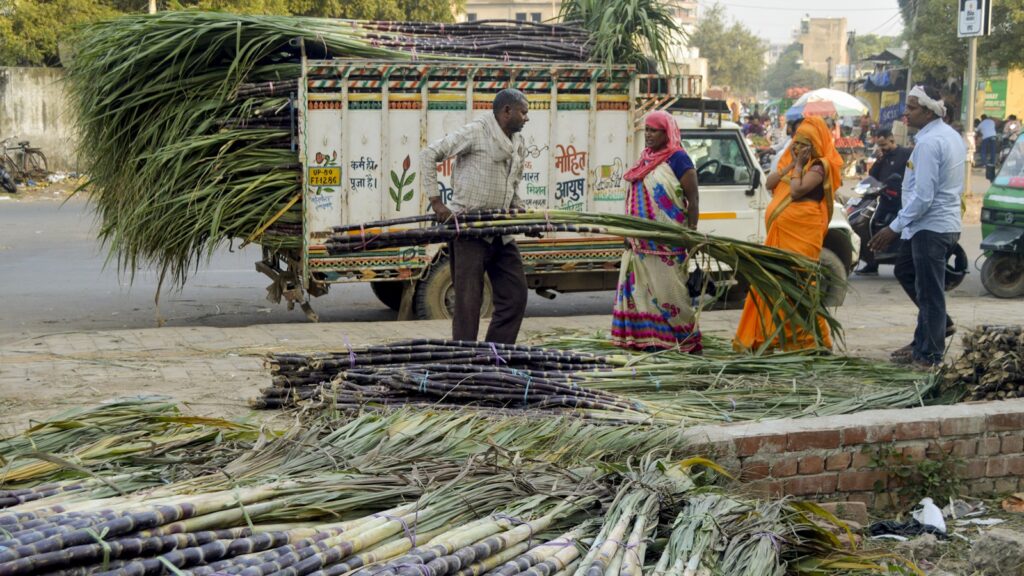A report by the US government’s labor department that classified sugarcane harvesting in Maharashtra’s Beed district as forced labour, has led to a strong reaction from industry stakeholders, claiming it “was drawn up on the basis of incomplete information.”
According to industry stakeholders, the research may cause international corporations with US headquarters to reconsider their approach to handling sugar produced in the state.

In contrast to the sugar business in Karnataka or Uttar Pradesh, sugar mills in Gujarat and Maharashtra hire workers to harvest and move cane from the fields. Most of the harvesters come from Beed, Ahmednagar, and a few other North Maharashtra areas. Through intermediaries known as mugaddams, mills communicate with the laborers.
The mugaddams work for mills after receiving an advance. Additionally, a lump sum payment is made in lieu of the service rendered when the farmers settle the final account. The US Department of Labor has referred to this Maharashtra-specific arrangement as forced labor.
According to the report, “List of goods produced by forced and child labor,” which was published last month, “there are reports that adults in India, mainly in the Beed district, experience forced labor in the production of sugarcane.”
The sugarcane industry frequently uses forced labor signs, including involuntary overtime, arbitrary wage deductions, deteriorating housing circumstances, and recruiting connected to debt, according to reports from NGOs and media outlets.
Furthermore, it asserts that “some workers report working without days off for 3–4 months, and workers regularly work between 12 and 14 hours in the fields without rest.” The sugarcane sector has never been discussed in this context in the report.
To harvest cane, Beed has historically sent workers to different regions of the state; approximately five-six lakh men and women leave their homes at the beginning of each season, which lasts for five-six months.
Stakeholders claim that because farmers work on their cane fields year-round and are paid on a daily basis, issues like healthcare access and leaves are not a concern.
The National Federation of Coop Sugar Factories Ltd. president, Harshawardhan Patil, referred to the report as malicious and irrational. Harshwardhan Patil said to Indian Express, “Harvesting and moving sugarcane by hand from farm to factory has long been a tradition in Maharashtra, India’s largest sugar-producing state. This technique helps maximize sugar recovery by minimizing cuts to crush time. The skilled workers receive enough housing, food, a timely salary (as determined by the labor board), health insurance, medical facilities, and education for their children. Sugar mills frequently provide social welfare services, such as planning group weddings”.
The report, according to B B Thombare, chairman of the West Indian Sugar Millers Association, the state’s highest authority for private millers, does not accurately reflect the situation. “We reject the report, which was drafted based on incomplete information,” he stated while talking to Indian Express team.
According to farm leader Raju Shetti, US-based experts paid him a visit a few months ago to learn more about how things operate. “I discussed my proposal for a private members bill to improve the harvesters’ predicament during the meeting. The state government established the cane harvesters welfare board, which was later named in honor of the late union minister Gopinath Munde, thanks to lobbying efforts by individuals like myself,” he said.
The board is tasked for building hostels and attending to the health and educational needs of harvesters in addition to determining the harvesting rate. He advised the US government to let individuals like us handle the task of defending the rights of the oppressed; we don’t need their assistance or opinion.
The state government claimed that the Ooshtodni Kamgar Mandal, which is in charge of the welfare of cane harvesters, had previously been established by the social justice department. However, Dhananjay Munde, Maharashtra’s minister for agriculture, refrained from commenting on the matter, citing the Model Code of Conduct.
The state government will match the Rs 10 that sugar mills provide for each tone of crushed cane. The money raised will go towards providing harvesters with healthcare and education. The harvesting process is already being mechanized; the source stated.
Read Also: Coldplay Announces 4th Concert In Ahmedabad: Check Out Ticket Sale Details